On March 1st, 2022 around 7 am the respondent and about 75 other people-on-the-move (POM) were pushed back from Kornofolia, Greece to somewhere close to the village of Kadıdondurma, Turkey.
The respondent is a 51-year-old male Egyptian. He traveled in a transit group consisting of eight POM.
On February 28th, 2022 the respondent reported that he left Istanbul in a van with seven other POM, Moroccan and Syrian, including one Moroccan woman. The age range of this initial transit group was 20 to 51 years old. They drove for around three hours while sitting on the ground of the vehicle. They arrived at a site near the border river in a small river still on Turkish territory, close to the village of Umurca, where they encountered four other groups of POM, each consisting of five to eight persons, adding to a total of around 30 people, including several women and around seven minors.
The respondent’s transit group left the car and took a boat from the van, which then left. They started to prepare the boat to be able to cross the Evros river. They had to wait at this point as on the Greek side of the river a patrolling car was parked. The respondent described the vehicle as a Greek Police Jeep.
A member of the transit group made a phone call in Greek. The respondent assumed that he must have been talking to someone in the car identified as a Greek Police Jeep on the other side of the river as he subsequently told the POM that “everything is under control, don’t worry!”.
The group used one of the plastic boats to cross the river. On the other side, they met two men wearing blue uniforms, black boots, and balaclavas who came out of the vehicle (mentioned above) and handed over the money. Due to the distance between them, the respondent was unable to further identify the uniforms.
The smugglers returned to the Turkish side of the river and the uniformed men and the Greek police vehicle left the river site. The POM were asked to cross the river rapidly with the boats as “[they] didn’t have too much time”. Five groups in five boats crossed the river in those plastic boats. These boats were described as paddle boats, “white from inside and gray from the outside”, measuring three by two meters. The smugglers and guides did not join the POM but stayed in Turkish territory. All POM made it across the river. Subsequently, the different groups parted and continued on different routes. Two members of the respondent’s initial transit group left as well and the remaining POM found themselves in a group of six persons.
The crossing took place at 6 pm on February 28th, 2022.
After this, the transit group started walking for approximately one hour through agricultural fields, trying to get far from the border. They arrived at a small forest where they hid until it got dark as they approached the town of Soufli, identified through a map by the respondent. As the POM supposed they could not pass the city in the daylight without being caught, they waited for around three hours in a spot in the forest, around 100 meters from a paved road.
At 10 pm they started to move again, strolling through the agricultural fields to find a way to pass the town unseen. After 30 minutes, at 10:30 pm on February 28, 2022, the transit group was apprehended on an unpaved road between two agricultural fields, not far from the paved main road.
While walking down the unpaved road in the dark, the POM were suddenly surrounded by two cars with big flashlights, which made them stop. The two vehicles were “civilian” black Ford pick-up trucks “with a big flashlight on the trunk”. The other vehicle, described as a “white Nissan with blue stripe” was identified as a Greek Police car by the respondent (Image 1).
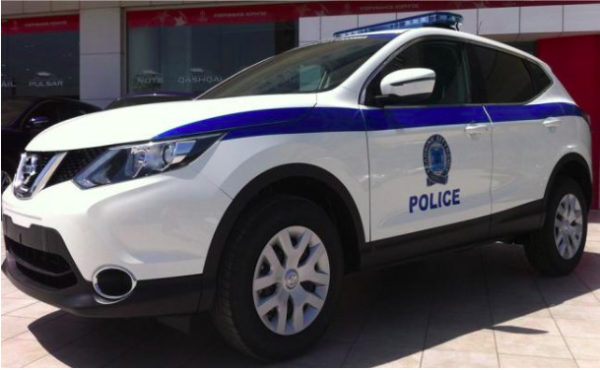
The vehicles were staffed with six men in long-sleeved dark blue uniforms, with “police” written on the left upper chest, the back, and carrying an insignia on the sleeve. These uniforms were identified as Greek Border Guard uniforms in the picture below (Image 2).
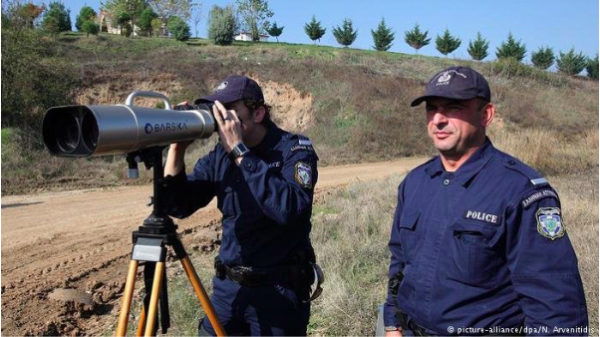
The men in uniform were armed with guns identified as looking similar to Heckler & Koch MP5 which they aimed at the POM in order to make them stop. All they said, in the beginning, was “Stop, stop! Sit down, sit down!” in English.
After the apprehension, the uniformed men started to kick everyone, except for the women. The POM were not searched at this point but their phones were taken. They had to kneel and keep their hands on their backs and were asked about their origin, how they crossed the border and where “the others” were. The uniformed men took pictures of the whole group – the respondent could not identify whether the pictures were taken with private phones or official devices.
After having to wait for 30 minutes on their knees, a white, unmarked Mercedes van, similar to Image 3, arrived and the POM were loaded into its trunk.
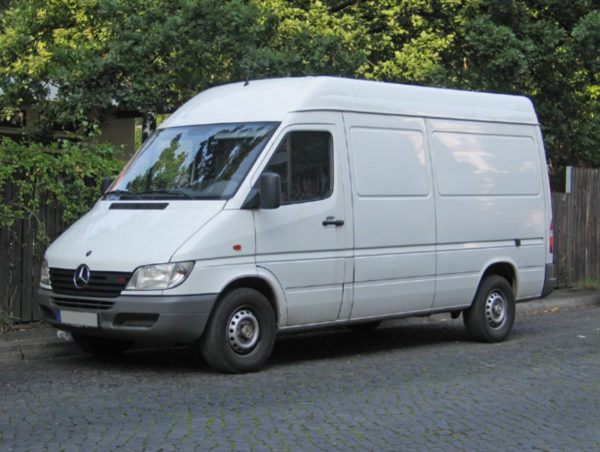
The white van was driven by two men wearing green camouflage pants, black shirts, and balaclavas. The clothing they wore did not have any insignia or symbols on them indicating it is a uniform. They drove for about 10 minutes in a fast and reckless way, making the people in the trunk suffer from the unpaved road full of potholes.
At around 11 pm, the group arrived at what the respondent described as a “detention site”. Accordingly, the building looked like an old farm with a garage and a small yard, surrounded by fences. There were no signs, writings, or flags which indicated that the location was an official state-run detention site. The building was located in a forest-dominated area, close to a big factory. In front of the site, two civilian cars were parked.
The entrance of the building was followed by a long hallway that led to a room where the POM were taken to in order to be searched. Five men wearing sage green jackets and pants with “police” writings on them, waited inside the detention site. Three of the uniformed men forced the POM to undress, searched their bodies and their belongings, and asked them questions for around 15 minutes.
The respondent suffers from myocardial insufficiency and had a serious and major operation in the last year. He carried the medicine he needed for this condition in his bag. When he explained his situation and asked one of the uniformed men to return it to him, he was pushed to the ground and hit with plastic batons. His medicines were not returned to him.
Reportedly, the woman was searched by male officers as well even though not forced to undress.
“One of them asked her to pull down her back bag and open her legs and raise her hands and he started touching all over her.”
After the search, backpacks, clothes, medicine, and money were taken from the transit group while only pants and shirts were returned. The uniformed men took about 150 € from the respondent.
The group was locked into a six-by-five-meter sized cell, which was described as “like a garage surrounded by fences. Dirty ground where there is pee everywhere and the smell is nasty and the toilet was dirty”. Inside the cell, around 70 other people were detained, including about nine women and several minors. Their nationalities included Morrocan, Syrian, Egyptian, Iraqi, and Afghan and the age range was between 10 to 60 years old.
The POM were detained for about five hours without being offered water or food. The respondent recounted that “No, they never give you [water or food]. I was afraid to die – they didn’t give me my medicines, do you think they would care if I’m thirsty or hungry?”
Neither were any documents of the POM checked nor had they signed any papers. No translators were present at the detention site.
After five hours, the POM were loaded in two unmarked, civilian-looking vans. One of them was a white Mercedes van (Image 3), and the other one was a white Ford Transit van.
The group was taken from the detention site by around seven men wearing “civilian clothes” and balaclavas. The respondent remembered that at least three of them wore jeans and camouflage short-sleeved jackets without any writing or insignias. These men were holding one-meter-long tree branches and used them to beat the POM in order to make them leave the detention facility faster.
Around 40 other persons – among them, the Moroccan woman of the respondent’s initial transit group and several minors – were loaded in the same trunk of a van as the respondent which measured about two by two meters. Most of the people were standing but some of them had to sit on the floor due to their level of exhaustion. In each van, there were three men in charge (referred to as “officers” by the respondent”).
From the detention site, they were taken to the border river. The drive took about 20 minutes and was reportedly fast and reckless, the people in the back of the vans “barely could stand”. Both vans arrived at the same point at the border river and the respondent and others from the transit group were forced to get out of the vehicles and to stand in line, without making a sound.
At this location, 17 – 20 men were already waiting. All of them wore balaclavas, three wore plain black uniforms without any writing or insignias on them and the remaining men wore civilian clothes. Some of the men spoke Arabic in a Syrian dialect. The men didn’t carry proper weapons but tree branches and spoke Greek among themselves.
Again, the POM were searched. While waiting in line, one of the men asked the respondent in Arabic to move on which made him step out of line. Immediately, another man kicked him in the chest and two others started beating him with a metal baton: “I was begging them to stop and they didn’t. I told them: ‘Please, blessed by Jesus, Mariam, whatever you believe in, don’t beat me more!’ But they didn’t stop.” This assault lasted for 30 minutes. All POM were beaten in this instance, including minors and women.
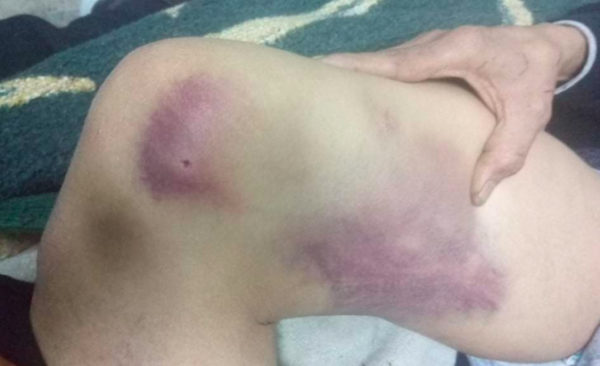
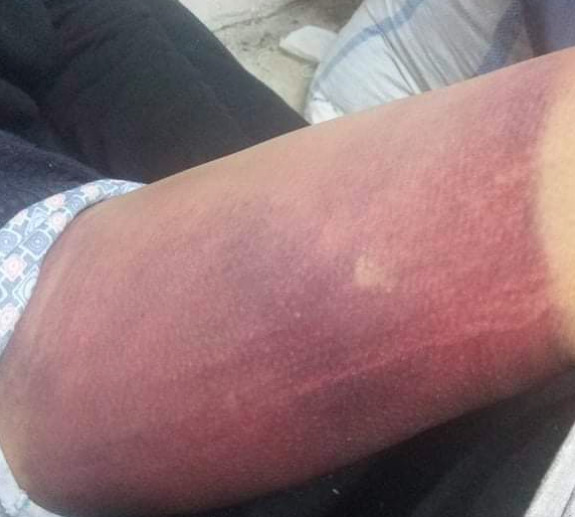
After that, the transit group was taken in two green camouflage plastic paddle boats, measuring two by three meters. In each boat, eight people and two drivers (stemming from the 17 – 20 men who waited at the pushback point already) were taken at the same time.
The POM were only taken halfway to the other side and forced to jump into the water in the middle of the river. The water level was almost reaching to the respondent’s chest and he described that “it was so cold we barely could stand. Continuing walking I was freezing!”.
In this way, everyone was pushed back except for the Moroccan woman, a member of the respondent’s initial transit group. Although she had gotten into the same boat as the respondent, she was taken out of it again by one of the men wearing balaclavas. She was not pushed back in this incident but the respondent also had no information about the whereabouts of the woman.
After his arrival on Turkish territory, the respondent asked others from the transit group for help as he was severely injured and couldn’t walk properly. He was helped by another Moroccan person who had experienced reportedly the same pushback and together they walked for about two hours to the village of Kadıdondurma where they got a taxi to Edirne.
The respondent expressed his intention to claim asylum twice – once in the detention site where he was simply ignored and once before the pushback at the river where he was beaten up as a response.
